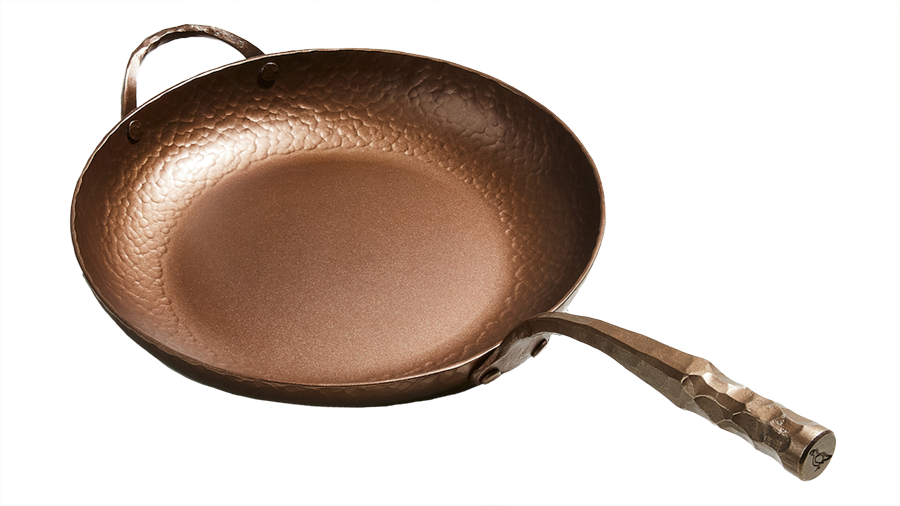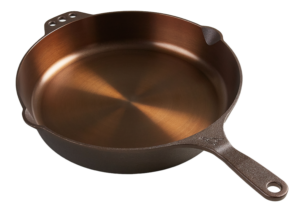
Why Smithey’s cast iron and carbon steel skillets lead the pack for quality and versatility
By Michael Hiller
Popular among chefs and home cooks alike because of their sheer versatility, cast iron and carbon steel skillets are considered by many to be essential elements of a well-equipped kitchen. A good pan can be used to cook nearly anything; a great one will follow you through a lifetime. But where to begin?
Both types of skillets can range in price from just over $20 to well over $300. They come in different sizes with different features. The best cast iron skillets come pre-seasoned, which can help prevent food from sticking to the bottom. The downside is that their heft can be unwieldy and not generally pretty enough to swipe right.
Fortunately, South Carolina-based Smithey thinks like we do. They make beautiful high-quality, hand-forged cookware that performs exceptionally well. In our kitchen, every appliance has to earn its spot. Smithey skillets are gold medalists.
 And, wow, can they strut: bronze-colored, polished interiors, angled walls engineered for frying and serving, California quail emblems embedded in the handle. A second carry handle simplifies lifting, transporting and storing the pan. A heat ring on the base telegraphs to visitors that you’ll be fine frying eggs on a campfire grate, or if the power goes out and you somehow find yourself sizzling burgers on a wood stove. Over time, Smithey skillets and pans take on a patina all their own. All this helps explain why Smithey’s 12-inch offerings — a traditional cast iron and a modern forged steel — are our new kitchen obsessions.
And, wow, can they strut: bronze-colored, polished interiors, angled walls engineered for frying and serving, California quail emblems embedded in the handle. A second carry handle simplifies lifting, transporting and storing the pan. A heat ring on the base telegraphs to visitors that you’ll be fine frying eggs on a campfire grate, or if the power goes out and you somehow find yourself sizzling burgers on a wood stove. Over time, Smithey skillets and pans take on a patina all their own. All this helps explain why Smithey’s 12-inch offerings — a traditional cast iron and a modern forged steel — are our new kitchen obsessions.
Smithey’s No. 12 Skillet nods to tradition with a few modern tweaks. Though the 2-inch-deep cast iron skillet weighs a solid 8 pounds, an 18-inch handle and that secondary grip make it easier to maneuver across hot burners or in a pizza oven. The surface is polished to a smooth, sleek nonstick finish. Pre-seasoned and ready to use, the pan will develop a rich patina with each use, making it an heirloom to display.
We love that the pan heats evenly and retains heat exceptionally well, perfect for searing steaks and baking cornbread. The thoughtful addition of pour spouts on opposite sides is ideal for southpaws and allows for easy transfer of sauces or grease. While the skillet’s weight might be a consideration for some, the heft ensures steady, even cooking.
The hand-forged Deep Farmhouse Skillet is Smithey’s answer to a modern chef’s needs for a lighter, more manageable skillet, especially in a busy commercial kitchen. Like cast iron, carbon steel pans are inherently nonstick and can withstand high temperatures. We love the farmhouse skillet’s deep basin and long, ergonomic handles on both sides, which provide a comfortable grip and excellent control. The hammered, textured cooking surface lends a beautiful sear to proteins and vegetables.
Both Smithey skillets are compatible with a variety of cooking surfaces, including gas, induction and open fires. The choice between the two comes down to personal preference: the traditional cast iron for those who value heritage and a pan that tells a story, or the forged iron for a contemporary cook.
